Mobile internet in Europe: What’s the best option?
If your next travel destination is the old continent, then one thing you need during your trip is definitely mobile internet in Europe.
When traveling to Europe, you have many options for staying connected to the internet. But which is the best option for getting mobile internet during your trip? The idea is for you to have an affordable, easy-to-access option that includes enough data!
There are different options for getting mobile internet, such as data roaming, free WiFi, pocket WiFi devices, and eSIM and SIM cards. You might need help choosing the one with the best service to stay connected while abroad, and that’s what we’ll give you here!
eSIM for Europe
>>Stay connected with an eSIM for Europe with unlimited data<< Get 5% OFF. Code: MYESIMNOW5



 +1M
+1M
With Holafly, you save +30% compared to roaming fees
Plans that may interest you
5 ways to get mobile internet in Europe
Having mobile internet gives you access to important messaging apps, such as WhatsApp, social media platforms like Instagram or Facebook, and even helpful tools to know where to go, like Google Maps.
An internet connection is one of the most important elements to consider for your trip to Europe. So, what are the different ways you can get online?
The main alternatives to mobile internet in Europe are:
- Prepaid SIM cards
- International eSIM cards
- Europe data roaming
- Pocket WiFi
- Free WiFi
So, here you’ll know all the advantages and disadvantages of each service, helping you choose the best option to get a steady mobile internet connection abroad!
Local network providers to use a SIM card in Europe
If you are thinking about which of the alternatives is the best to use your mobile phone in Europe, so we’ll start with the local companies with a review of costs, features, and the advantages and disadvantages of this service with a local prepaid SIM card.
Prepaid SIM card for Europe
Prepaid local SIM cards are similar to the ones you use in your country. The main difference is that these work abroad by connecting to local networks without adding additional costs while including data, phone calls, and SMS.
There are two ways to get a local SIM card. You can either purchase one through an online store or wait until you arrive in Europe to buy it in physical stores or vending machines.
Some of the key network providers in Europe include:
Vodafone
Vodafone is one of the most important mobile carriers in Europe, so chances are you’ll find a store in most destinations. Their SIM cards work with 4G and 5G speeds, including some minutes and SMS with the data plan you’ll get.
The main disadvantage is that you need to wait until you arrive at your destination to have internet in Europe, making it harder to access certain apps and services, such as asking for an Uber or messaging your family and friends.
Orange
Orange is also an important carrier in Europe. It has improved its traveling service by offering SIM cards so you can visit the whole continent with its Orange Holiday Europe service. Their data plans range from €4.99 to €49.99, and their most complete plans include mobile data, phone calls, and SMS.
Compared to Vodafone, Orange allows customers to purchase SIM cards and choose where to pick them up, making it easier for them to get mobile internet as soon as they arrive.
The main disadvantage is the delivery time since you have to wait until the SIM card arrives before leaving.
Yoigo
Yoigo is another option similar to Orange. You can purchase your SIM card online for €15.00 per month. The main advantage is there’s no need to sign a long-term contract to use their services.
Since Yoigo is a Spanish operator, free calls are available in the country, but there’s an extra fee if you want to make calls and send SMS within the European Union. The amount of data for this data plan is 50 GB.
As for a disadvantage, Yoigo only offers delivery within Spain, making it harder for foreigners to get a SIM card to travel around Europe.
Prepaid SIM cards for Europe comparison
How do these providers compare side-by-side?
Take a look at the table below for a quick overview of key features, pricing, advantages and disadvantages:
| SIM card features | Vodafone | Orange | Yoigo |
| Data speeds | 4G/5G | 4G/5G | 4G/5G |
| Price | €10 to €40 | €4.99 to €49.99 | €15 |
| Text messages | Yes | Yes, included some plans | Yes |
| Phone calls | Yes | Yes | Yes |
| Advantages | Prepaid SIM cards include different data plans Great coverage for most European destinations Doesn’t require a contract to buy a SIM card | Delivery available in Europe Phone calls and text messages included in most plans Data plans work for 7 to 28 days. | Cheap price for what’s included with the SIM card No contract is needed to buy a SIM card Data speeds are available up to 5G |
| Disadvantages | No delivery is available; only available in-store | Delivery time can have delays | Only available for delivery in Spain |
International eSIM for traveling to Europe
If you don’t want to wait for a SIM card to be delivered, using eSIM cards is your ideal option to stay connected within European countries. The only thing you need is to have an eSIM-compatible device!
Different companies offer virtual SIM cards online. Still, we’ll focus on what Holafly offers since it’s one of the main services you can get to travel and stay connected in Europe.
It has unlimited data and allows you to share data with other devices for up to 1 GB per day. So, let’s talk more about it.
eSIM Europe by Holafly
The Holafly eSIM for Europe pairs high-quality features with low prices. We’ve already covered its unlimited data plan and hotspot option, so it’s time to discuss the other details of the eSIM.
Prices start at $6.90 USD for 1 day, and you can choose up to 90 days for $139.90 USD. You can select the exact number of days your trip will last, helping you save money on data packages you won’t use.
There is also the option of a postpaid eSIM plan that covers countries in Europe and beyond. Holafly Connect allows you to enjoy reliable internet throughout Europe and more without swapping SIM cards. The options include unlimited data, 25 GB, or 10 GB plans, all with the hotspot option. The best thing about it is that it is contract-free and you can activate it in minutes.
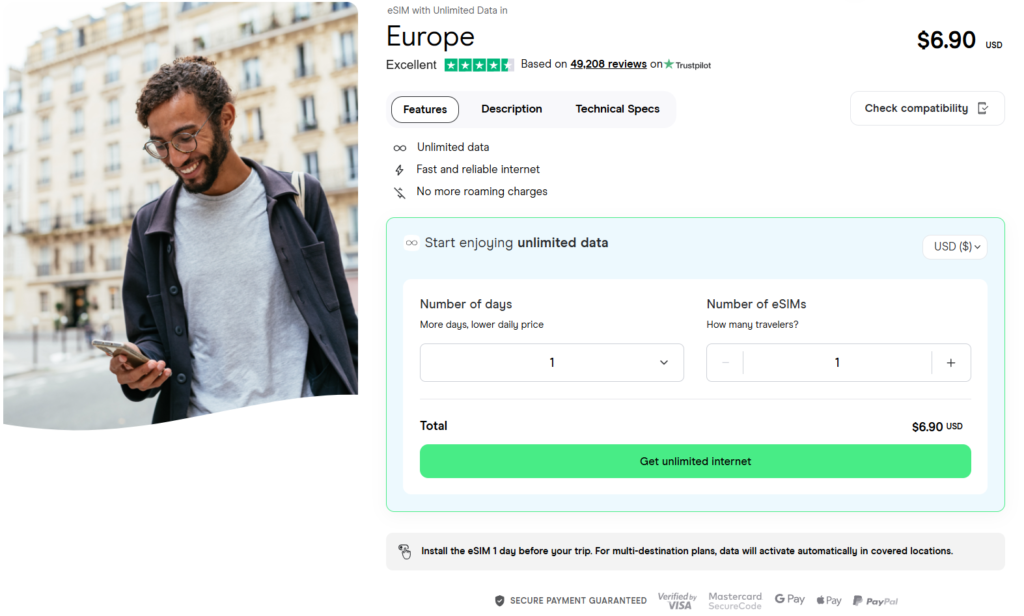
The best part of the eSIM is that you can use it in 40 different countries around Europe, making it a great alternative for tourists who want, for example, an Italian eSIM Card, a Portuguese eSIM card, or both. Let’s discuss the advantages and disadvantages of this service.
Advantages of Holafly’s eSIM for use in Europe
- Holafly provides a strong internet connection across Europe with up to 5G data speeds.
- You can keep your WhatsApp number in your language without any problem.
- The eSIM is very easy to activate through a QR code or through the iOS app on your mobile phone.
- No contracts or purchase clauses are required to get a Holafly eSIM.
- Holafly offers high-end 24/7 customer support in different languages and through different channels.
- The Holafly eSIM for Europe works with the best mobile operators in Europe.
- You can share up to 1 GB per day with your unlimited internet plans.
- If you need to extend your plan, you can purchase a top-up automatically activated on your eSIM.
- If you’re planning a longer stay, you can check out Holafly Connect and get a postpaid eSIM.
Disadvantages
- Holafly doesn’t include phone calls or text messages, but phone calls are available through VOiP apps thanks to the unlimited data plans.
Roaming in Europe with your local operator
Another option to get an internet connection in Europe is using the data roaming service from your local operator.
Almost every operator offers their data roaming services on mobile devices, but these are more expensive than other alternatives on the list. Depending on your carrier, the Europe data roaming service can cost up to $10 USD per day.
Also, not all carriers include text messages and phone calls on this service, so you have to check whether there are additional charges for using these while abroad.
Let’s talk about some alternatives from the USA and Australia and their roaming fees.
Verizon
If you are from the USA and a Verizon client, you can use their roaming to stay connected in Europe for $10 USD per day with their International Pass. This service works in different countries around the continent.
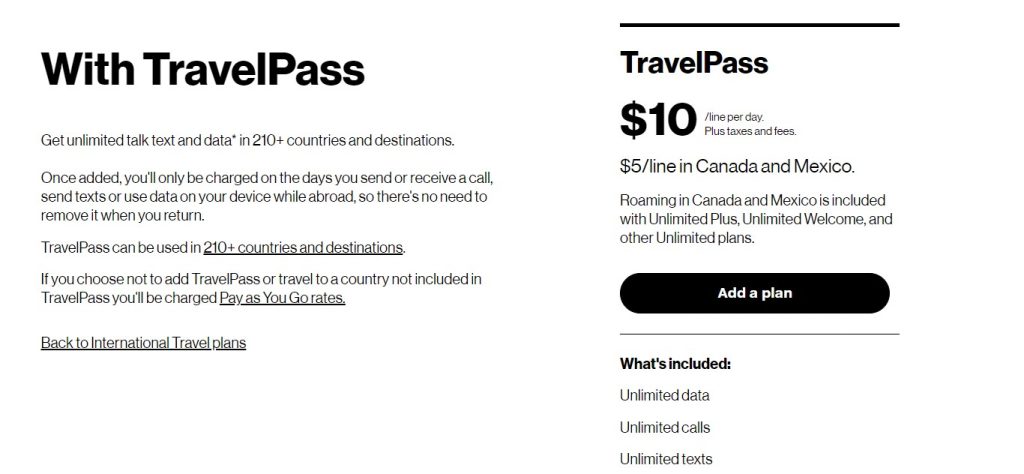
This service includes unlimited data, phone calls, and text messages, with a daily data usage limitation of 2 GB.
Telstra
If you are in Australia and plan to visit Europe using Telstra roaming plans, it will cost you $10 AUS daily to get 2 GB of mobile data, unlimited calls, and SMS for most European countries.
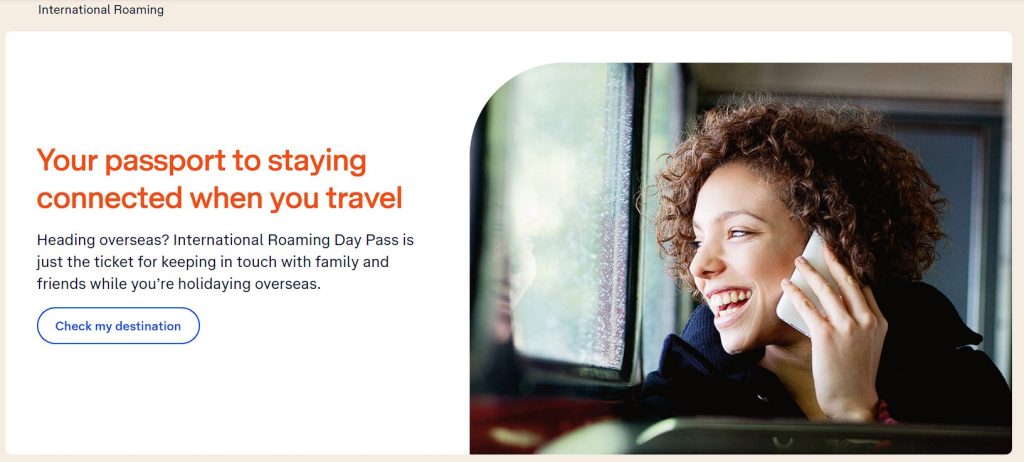
One disadvantage is that Telstra only offers this plan if you have an upfront plan, as stated on their website since non-upfront plans must use pay-as-you-go rates, which cost $3 USD per MB consumed.
AT&T
Lastly, another option if you are in the USA is AT&T. There’s an international data plan for roaming abroad for $12 USD per day, including high-speed internet in Europe, SMS, and phone calls.

Like other companies, AT&T has the pay-as-you-go service available, costing $2.05 USD per MB consumed.
Pocket Wi-Fi in Europe
A pocket Wi-Fi device allows you to connect to different devices and get mobile internet in all of them with high data speeds (most companies offer 4G data speeds). The best part about these devices is that they are easy to carry during your trip.
What’s important about a pocket Wi-Fi device is the service price. Companies like Travelers WiFi or Cello Mobile can charge you up to $100 USD per week, and those are the rates without adding delivery and additional items to your purchase, as some companies include portable charges, for example.
Lastly, while this is a convenient option for visiting many European countries, remember that you are charged an additional fee if something happens to the device. Based on the company’s policies, the additional charge can be higher than $200 USD.
Free Wi-Fi
Due to Europe being such an important tourist destination, there are often open hotspots in restaurants, hotels, malls, and even airports, which helps to save money.
The downside of staying connected with free Wi-Fi hotspots is that they are not always safe to use. That’s why our advice is to only rely on these if you don’t have access to mobile internet in Europe. When using Wi-Fi hotspots, make sure to avoid introducing any personal or financial information.
FAQs about mobile internet in Europe
To get internet in Europe, you can use an eSIM with Holafly’s plans, which are our favorite since these include unlimited data. Using prepaid SIM cards, pocket WiFi devices, roaming, and free WiFi are also alternatives to get internet when traveling.
You can get WiFi in Europe in different ways. For example, the Holafly eSIM for Europe includes 1 GB of data sharing per day, and there are other alternatives, such as pocket WiFi devices and free hotspots you can use.



















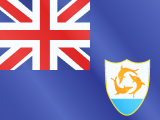
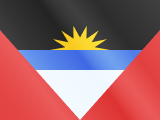





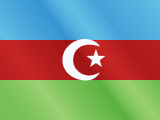




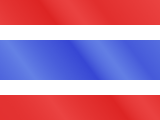






 Pay
Pay  Language
Language  Currency
Currency 


















 No results found
No results found





